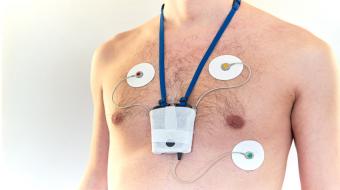Featured Videos
Premier Practitioners
All Videos
Cardiac testing is used to detect and diagnose heart disease, and the goal is to find cardiovascular disease at its earliest stage. Depending on the patient’s condition, cardiac testing may include blood tests, imaging tests and genetic tests. If your physician or cardiologist feels that you need further testing, you may undergo other procedures, including the ones outlined below.
Echocardiograms
An echocardiogram is an ultrasound that is performed on the heart. The purpose of an ultrasound of the heart is to understand the structures, as well as the function of the heart in terms of its pumping function, its relaxation properties, and how well the one-way valves work. Your healthcare team can also get other information such as an indirect assessment of pressures inside the chambers of the heart and the sac that lines the heart. This test is often used when an abnormal function of either the cardiac performance or an abnormal function in one of the valves is suspected.
Cardiac Stress Testing
A stress test is an assessment of someone’s physiological or aerobic reserve, and a fairly good assessment of a person’s hemodynamic and circulatory response to exercise. The most common algorithm that’s used on a treadmill is something called the BRUCE protocol. The test assesses your fitness level, the health of the circulatory system, and looks for problems with plugged arteries or atherosclerosis.
The treadmill examination actually doesn’t allow healthcare providers to look at the arteries themselves; but infers a problem with the arteries. Because of this limitation, treadmill examinations can be wrong, and there is up to a one-third chance of a false positive.
The Holter Monitor
A Holter monitor is a test that’s performed in order to understand the rhythms of the heart. A Holter monitor is worn by an individual, and consists of a battery pack, a small computer and electrode leads that the patient puts puts on. After the 24-hour testing period, all of the heartbeats that are generated by the patient are captured by the Holter monitor, and the healthcare team downloads and interprets it. This test is used when there is a suspicion of the electrical sub-system of the heart that may cause rhythm problems; either rhythm problems that generate overly quick heart rhythms, or tachyarrhythmias, or overly slow rhythms such as bradyarrhythmias.
Talk to your healthcare provider if you'd like more information on cardiac testing.
Visit HealthChoicesFirst.com for more videos and resources on heart health.
There are ways in which a cardiologist can detect underlying heart disease, electrical problems and valve conditions by using diagnostic tools such as a stress test, holter monitor or an echo cardiogram. These diagnostic tools are important in the prevention and monitoring of certain heart conditions.
A cardiologist local is a physician with special training and skill in finding, treating and preventing diseases of the heart like atrial fibrilation cholesterol COPD and blood vessels. Local Cardiologists work with patients to treat conditions including coronary artery heart disease, heart attack, atrial fibrillation and irregular heart rhythm. A cardiologist can help you manage risk through nutrition, exercise and lifestyle changes.





